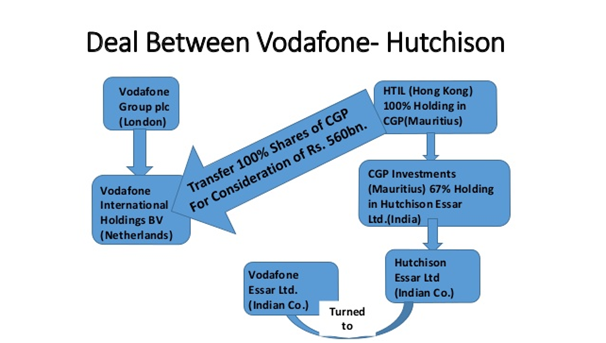The Ministry of Law and Justice has notified the Taxation Laws (Amendment) Act, 2021 to amend the Income-tax Act, 1961 and the Finance Act, 2012. Let's start this article from the case of Vodafone to understand ' why this Amendment bill has been introduced.
What was the deal between Vodafone - Hutchison?

In May 2007, Vodafone had acquired a 67% stake in Hutchison Whampoa for $11 billion. This included the mobile telephony business and other assets of Hutchison in India. In September that year, the India government for the first time raised a demand of Rs 7,990 crore in capital gains and withholding tax from Vodafone, saying the company should have deducted the tax at source before making a payment to Hutchison.
Vodafone challenged the demand notice in the Bombay High Court, outcome was in favour of the Income Tax Department. Subsequently, Vodafone challenged the High Court judgment in the Supreme Court, which in 2012 ruled that Vodafone Group's interpretation of the Income Tax Act of 1961 was correct and that it did not have to pay any taxes for the stake purchase.
So, the issue of taxability of gains arising from the transfer of assets located in India through the transfer of the shares of foreign company (hereinafter referred to as "indirect transfer of Indian assets") was a subject matter of protracted litigation. Finally, the Supreme Court in 2012 had given a verdict that gains arising from indirect transfer of Indian assets are not taxable under the extant provisions of the Act.

What is a 'Retrospective taxation case'?
The same year, the then Finance Minister, Late Pranab Mukherjee, circumvented the Supreme Court's ruling by proposing an amendment to the Finance Act, 2012 with retrospective effect, to clarify that gains arising from sale of share of a foreign company is taxable in India if such share, directly or indirectly, derives its value substantially from the assets located in India.Thereby giving the Income Tax Department the power to retrospectively tax such deals. The Act was passed by Parliament that year and the onus to pay the taxes fell back on Vodafone. The case had by then become infamous as the ' retrospective taxation case'
What happened after India passed the retrospective taxation law?
After the said amendments the onus to pay the taxes fell back on Vodafone.Once Parliament passed the amendment to the Finance Act in 2012, income-tax demand had been raised in seventeen cases. The amendment was then criticised by investors globally, who said the change in law was ' perverse' in nature.
Following international criticism, India tried to settle the matter amicably with Vodafone, but was unable to do so.By 2014, all attempts by the telco and the Finance Ministry to settle the issue had failed. Vodafone Group then invoked Clause 9 of the Bilateral Investment Treaty (BIT) signed between India and the Netherlands in 1995.In its ruling, the arbitration tribunal was also in favour of Vodafone.
What is Taxation Laws (Amendment) Bill?
It is argued that such retrospective amendments militate against the principle of tax certainty and damage India's reputation as an attractive destination.
Therefore, the Bill proposes to amend the Income-tax Act, 1961 so as to provide that no tax demand shall be raised in future on the basis of the said retrospective amendment for any indirect transfer of Indian assets if the transaction was undertaken before 28th May 2012.
The Bill proposes to nullify the tax liability imposed before 28th May 2012 on such persons provided, they fulfil certain conditions. These conditions are:
(i) if the person has filed an appeal or petition in this regard, it must be withdrawn or the person must submit an undertaking to withdraw it,
(ii) if the person has initiated or given notice for any arbitration, conciliation, or mediation proceedings in this regard, the notices or claims under such proceedings must be withdrawn or the person must submit an undertaking to withdraw them,
(iii) the person must submit an undertaking to waive the right to seek or pursue any remedy or claim in this regard, which may otherwise be available under any law in force or any bilateral agreement, and
(iv) other conditions, as may be prescribed
The Bill provides that if a concerned person fulfills the above conditions, all assessment or reassessment orders issued in relation to such tax liability will be deemed to have never been issued. Further, if a person becomes eligible for refund after fulfilling these conditions, the amount will be refunded to him, without any interest.
As per the amendment, the centre will withdraw back all tax demands on companies and will refund the money collected to enforce such levies. This is crucial as the country stands at a juncture today when quick recovery of the economy after the COVID-19 pandemic is the need of the hour and foreign investment will play a significant role in promoting faster economic growth.
The author can also be reached at info@adaptassociates.com
Also Read:








 CAclubindia
CAclubindia
